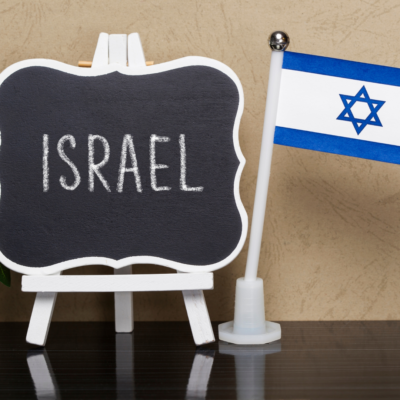This past weekend, my colleagues Sara Himeles, John Kunza, Abigail Ellis and I attended the BBYO International Convention in Baltimore, along with 2,500 Jewish teens and 1,000 adults from all around the world.
For five hours, I had one of the most meaningful educational experiences in my career. Jewish students from across the globe – Australia, Finland, Slovenia, Czech Republic, South Africa, Germany, Canada, USA, Spain and more – spent five hours studying Zionism, how they relate to Israel today, and what it means to be part of the Jewish people. As the term “Jewish peoplehood” is becoming more popularized, I can think of no better example of Jewish peoplehood than the BBYO conference from this past weekend.
As I was leading this session, Sara was meeting with educators, professionals, philanthropists and teen leaders from BBYO to discuss how we can all improve Israel education and deliver the best education possible in 2022.
Below are 10 reflections from Sara on her experience. These are ideas and sentiments that Sara heard that you can reflect on. For each of these takeaways, do you agree, disagree or see it differently?
The session was anonymous but not confidential, so Sara is sharing takeaways from the experience, but is not attributing any specific quotes. We hope you can use these ideas to spark your own thinking about Israel education and apply this to your teaching.
Is it possible to have constructive conversations about Israel on social media? How has antisemitism impacted Israel education? Is being anti-Zionist and Jewish a uniquely American identity? Here’s some of the conversation that Sara heard in response to those questions.
Best,
Noam
1. Teens get their information about Israel from social media (no surprise), but it’s challenging to have meaningful conversations in the comments section.
At a panel discussion with three teen leaders from BBYO, all said that they get their information about Israel from social media (which should be no surprise). But they also underscored that social media does not tend to be conducive to constructive conversation.
“I have barely engaged in social media the last couple of years because if I do, I will just get into meaningless shouting arguments,” one teen panelist said.
To talk about Israel in a constructive way, “you need to have a conversation,” another said.
“The issue when it comes to social media is that you post something and you’re done. You don’t have a conversation about it, even in the comments section because there is no back and forth.”
2. Conversations on social media spill over into life in the real world. Constructive conversations are more likely to happen in DMs (direct messages) and offline, but social media is an important starting point.
One teen panelist said that while it is difficult to have meaningful conversations in the comments section, it is more likely to happen in direct messages and other private discussions.
When you see a hateful post on social media, “contact the person in private,” he recommended. “Try to ask them, where does this come from?” They might be willing to engage constructively, he said.
I asked our social media manager, Abigail Ellis, for her perspective on this. She agreed that most of the time, meaningful conversations are not likely to take place in the comments on social media. However, she said that social media can certainly spark meaningful conversations that happen in direct messages and offline.
“I do think social media creates an important starting point for having these conversations because you’ll see a post, share it with your friends, and have a discussion offline or in voice notes,” Ellis said.
Although meaningful conversations typically don’t take place in the comments, it still happens from time to time on Unpacked social media. Here’s one example of that from our TikTok video on Japan’s Jewish Olympian:
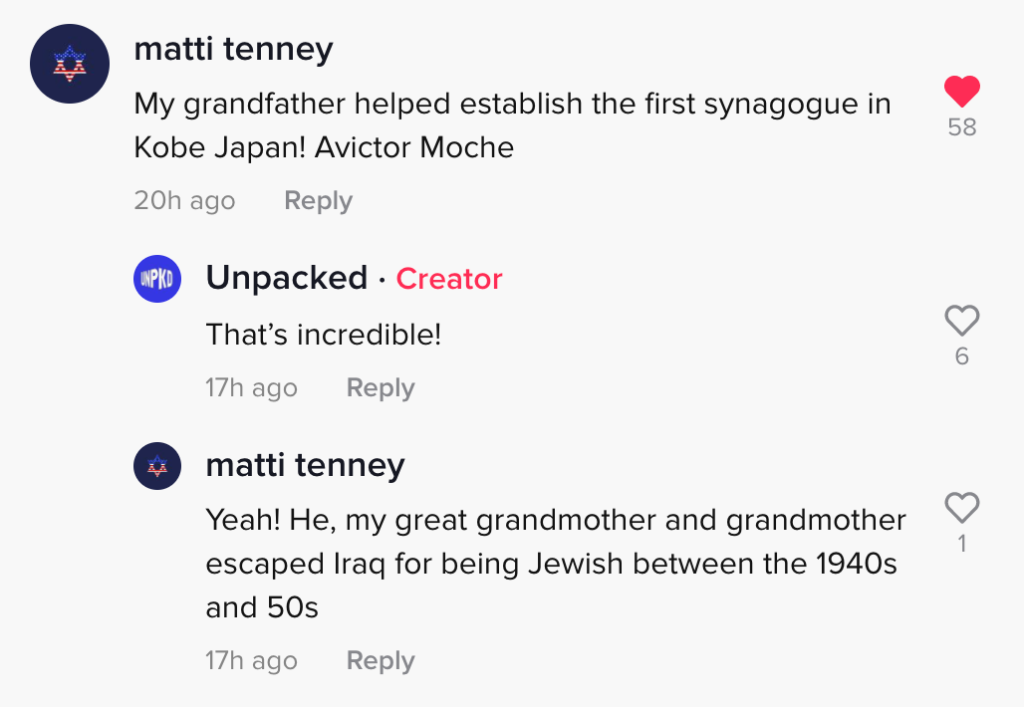
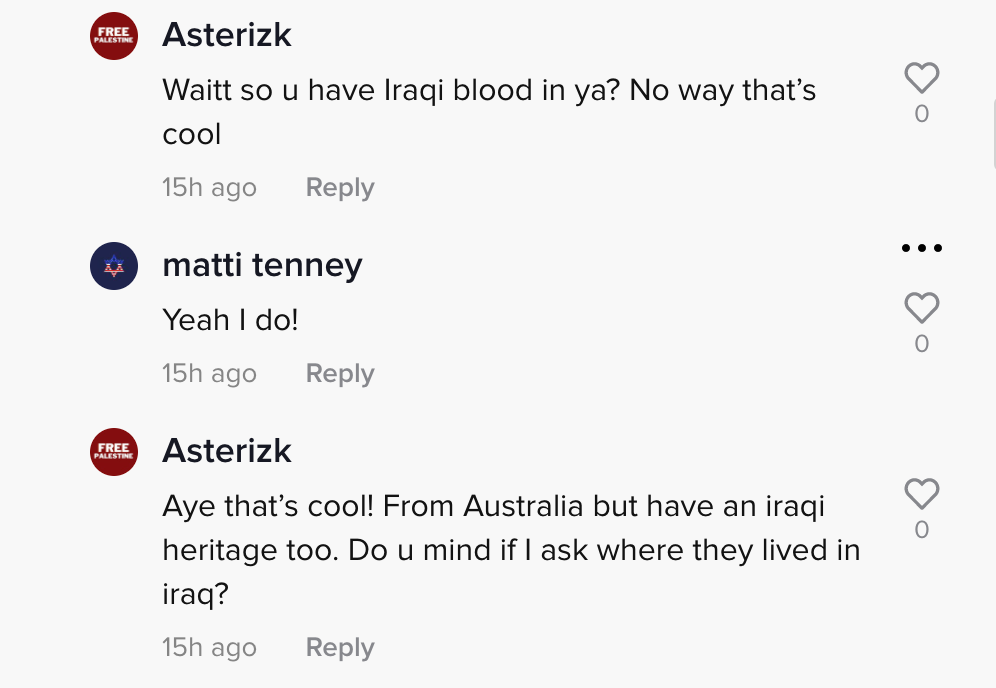
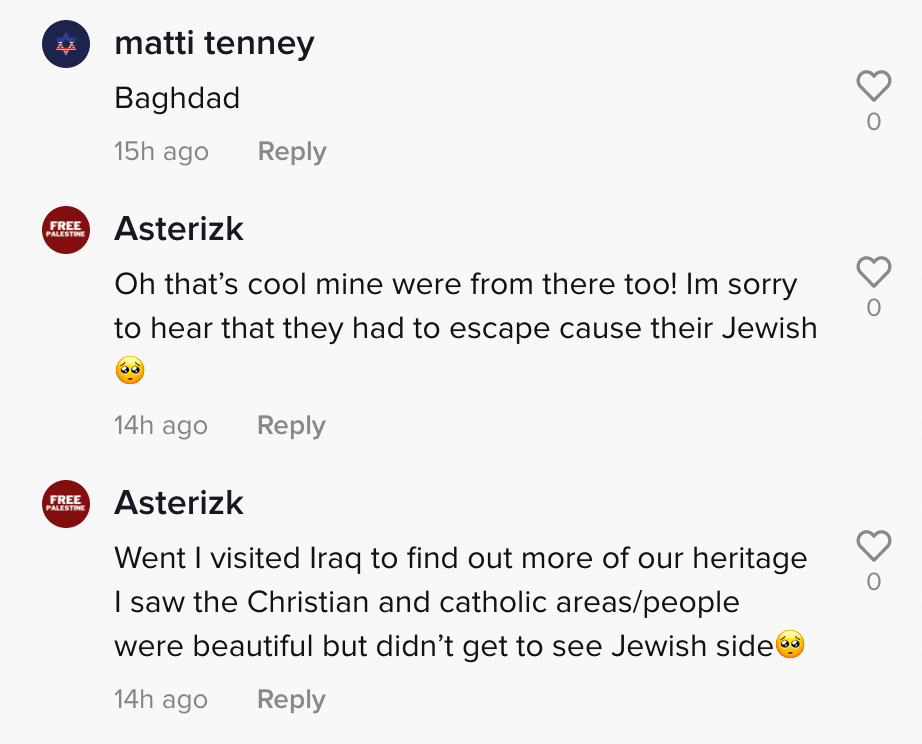
3. Is social media more effective for education than it is for persuasion?
One leading Jewish educator posed the following question to us: “Have you ever changed your opinion because of something you saw on social media?”
There were approximately 10 adults and teens combined in our group — of those, not one person said they had changed their minds because of something they saw on social media.
I then asked our group a different question: “Okay, but have you ever been educated by something you saw on social media?” Every person said they indeed had been educated by social media. This made me wonder, should we be focusing on social media as a tool for education rather than persuasion?
At Unpacked, we are constantly using social media this way. For instance, we’ll post the main points from every Weekly article as an Instagram carousel, using several slides to give more information and context:
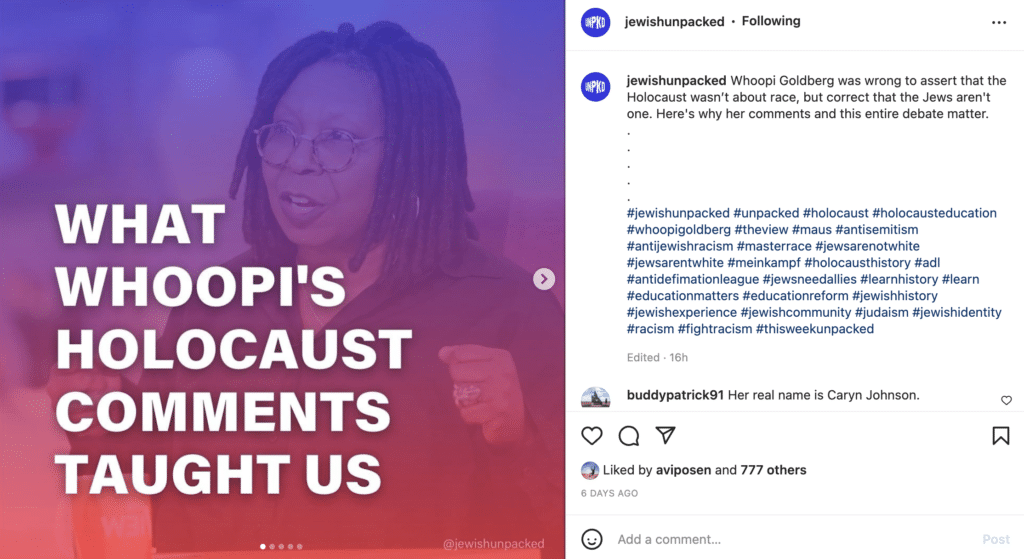
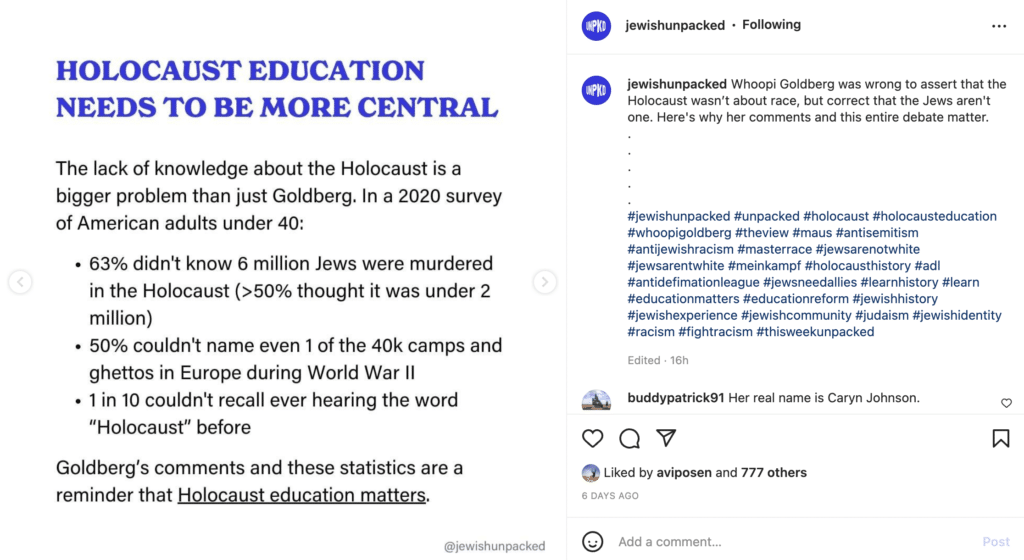
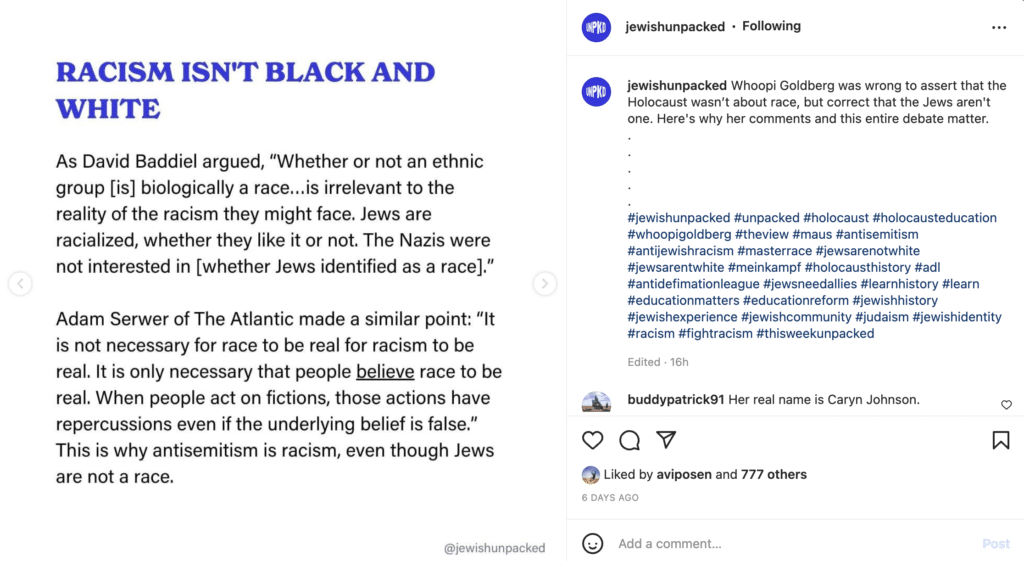
4. According to three Jewish teen leaders, the best way to combat misinformation and stereotypes is education and mindful engagement.
How can we best respond to misinformation and stereotypes about Israel?
“When people tell me that Israel is a racist, settler, colonial state, I can best respond to that with education,” one teen said. “Shouting fights are not effective and education is.”
Another teen agreed, asserting that “The best way to combat misinformation and skewed perspectives is education.” But education alone, he said, is not enough — we also need skills to communicate effectively with others.
“To learn to speak we must learn to listen,” he explained. We ought to engage with those who espouse hateful views “not for the sake of proving them wrong but to make a better world.” A third teen underscored that having a calm demeanor is critical to engaging effectively with those who espouse antisemitic or racist views.
5. For students today, Israel education is a life skill.
Gone are the days when Israel education was a luxury, designed to enrich students’ Jewish identity and help them create personal connections with Israel. While that remains the goal of Israel education, after the fighting between Israel and Hamas in May of last year, “we are in a different climate now,” one educator asserted.
“It’s no longer just about, ‘How do you connect to Israel?’” she explained. “We need to prepare people in a whole new way.”
“Israel education has become a life skill, especially for teens getting ready for college,” she added. “It has to happen.”
In the discussion, adults and teens talked about how Jewish students are indeed on the front lines of the toughest conversations about Israel (whether they want to be or not). This was particularly true in May 2021, and we can expect more of this when the conflict is in the news.
The reality is that our students are frequently hearing anti-Israel claims such as “Israel is an apartheid state,” “Israel is an occupying power” and “Zionism is colonialism.” As Israel educators, we have a critical role to play in helping our students feel more confident engaging in these complex issues.
6. Nuanced Israel education means presenting multiple narratives, both others’ and our own.
At one point during the discussion, a teen said that she felt ill-equipped to engage in conversations about Israel because she felt she had been “lied to” in her Israel education.
As we have written about before, glossing over the controversial and challenging parts of Israeli history and current events not only leaves students unprepared to engage in difficult conversations; it also backfires and leads to resentment toward Israel later on.
While we need to ensure we include multiple perspectives in Israel education, including Palestinian perspectives, we should also steer clear of the opposite extreme: assuming our students already know their own story and only teaching other perspectives.
We discussed how nuanced Israel education is not complete unless it includes our own story, including the Jewish people’s ancient connection to the land of Israel and the Jewish people’s journey vis a vis the land. This does not take away from the narratives of Palestinians or others, but gives our students a deeper understanding of their own story and the history behind the conflict today.
7. The beginning of Israel education is the Torah, not Theodor Herzl.
When discussing the best way to approach Israel education, educators agreed it should begin with the Torah, not the modern Zionist movement.
One rabbi and educator suggested the following framework for Israel education: Am Yisrael (the people of Israel), Eretz Yisrael (the land of Israel), Medinat Yisrael (the state of Israel).
In a time when so many parts of life, including the topic of Israel, has become so politicized, rooting Israel education in our common story could help us transcend politics and provide a stronger foundation to discuss controversial topics with our students.
8. “It’s a privilege to be anti-Zionist.”
“I haven’t met a single person in Argentina who is anti-Zionist,” an Argentinian Jewish teen told us in a discussion on anti-Zionism and antisemitism.
She explained that given the history of antisemitism in Argentina, the Jewish community there understands the need for Israel if they ever needed to flee the country.
“It’s an American thing to be Jewish and anti-Zionist, it’s a privilege to be anti-Zionist,” she said.
9. When approaching Israel education, ask, “What does good education look like?”
Toward the end of the discussion, one educator commented that when thinking about the best way to improve Israel education, we should ask ourselves what good education looks like in general and apply those same principles to the topic at hand.
“Israel can be distracting” to our education goals, he said.
As many have said in the past, good Israel education is good Jewish education. Good Jewish education is good education.
10. Teens and our students must be part of the discussion on Israel education.
If there was one repeated refrain among all of the adults present at the conference, it was, “The teens are incredible!”
Everyone seemed to agree that the teens had excellent ideas about how to improve Israel education and should be part of any discussions moving forward.



